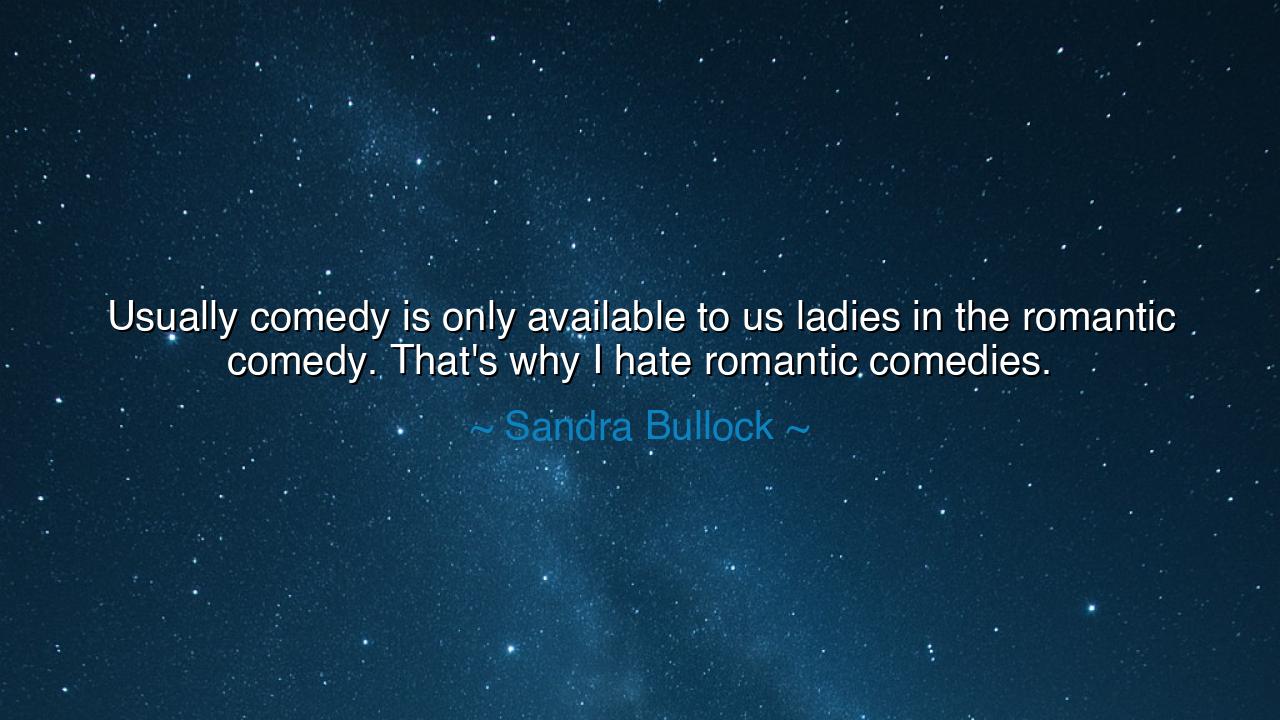
Usually comedy is only available to us ladies in the romantic
Usually comedy is only available to us ladies in the romantic comedy. That's why I hate romantic comedies.






“Usually comedy is only available to us ladies in the romantic comedy. That’s why I hate romantic comedies.” Thus spoke Sandra Bullock, and though her words seem simple, they pierce the heart of an ancient struggle—the struggle of women to find full freedom of expression, not bound by narrow roles or limited expectations. In this saying lies not only frustration, but also a demand for justice: that laughter, wit, and the power of comedy should not be caged within the walls of sentiment, but should be allowed to roar as freely for women as it has for men.
For centuries, the stage and screen have placed women in chains of stereotype. The romantic comedy gave them presence, yes, but often only as seekers of love, objects of longing, or foils for male wit. Rarely were they permitted to be jesters, satirists, or clowns in their own right, wielding the sacred weapon of humor to mock power, question society, or reveal deeper truths. Thus Bullock’s words strike like a hammer: why must women’s comedy be bound only to romance, when men have for generations ruled freely across every form of laughter?
The ancients knew the strength of comedy as more than mere entertainment. Aristophanes used it to ridicule the powerful, to challenge war, to unmask hypocrisy. His players, nearly all men, dressed women upon the stage, for women themselves were not permitted to act. Thus from the very birth of theater, the female voice in comedy was silenced or made to serve the male imagination. This injustice echoes across time, reappearing in the film industry of the modern world, where women like Bullock must cry out against the narrowing of their roles.
History gives us other examples of voices breaking free. In the court of Queen Elizabeth, women were often silenced in theater, but in her reign, she herself became a living example that wit, intelligence, and power could be worn by a woman as regally as any crown. Centuries later, Lucille Ball shattered barriers in television, proving that a woman could carry not only romantic comedy but physical humor, satire, and absurdity with unmatched brilliance. Yet even with such victories, the larger pattern persisted: women were given laughter only in limited doses, within “acceptable” boundaries.
Bullock’s rejection of romantic comedies is not hatred of love, nor of laughter, but of the cage. To her, the genre often reduces the woman to a trope: clumsy but adorable, independent but in need of saving, funny but never threatening. She demands more. She demands that women be permitted the same spectrum of comedy as men—that they may be clever, bawdy, outrageous, political, satirical, even grotesque if the art demands it. In short, she desires freedom for women to wield humor in its fullness, unchained from the dictates of genre.
The lesson for us is clear: laughter is power, and power must not be hoarded. To deny women the full landscape of comedy is to deny them one of the most ancient tools of human expression. Just as tragedy gives dignity to suffering, comedy gives dignity to resistance. If women are allowed only one narrow corner of it, then half of humanity is silenced in its power to challenge, to heal, and to inspire.
Practical action flows from this: support the voices of women in every form of comedy. Celebrate not only their roles in romance, but also in satire, stand-up, political parody, and experimental forms. When you encounter a woman’s voice wielding humor outside the bounds of convention, do not dismiss it—amplify it. For in doing so, you honor not only her, but the sacred art of comedy itself, which belongs to no gender alone.
So, children of tomorrow, remember Sandra Bullock’s cry. Do not accept the narrowing of laughter. For the divine gift of comedy must belong to all: men and women, strong and weak, rulers and commoners alike. Only then will humor fulfill its highest purpose—to illuminate truth, to bind humanity in shared joy, and to give the oppressed a weapon sharper than any sword.






AAdministratorAdministrator
Welcome, honored guests. Please leave a comment, we will respond soon